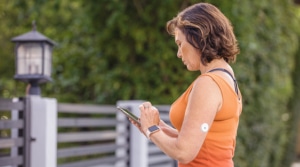
A majority of people with diabetes will have to deal with high blood pressure – and this condition can make the complications of diabetes worse. Discover the connections between hypertension and diabetes and find out how you can control high blood pressure.
If you have diabetes, there’s a good chance you’re under pressure – literally! The Centers for Disease Control and Prevention states that nearly half the adults in the United States (47% or 116 million) have high blood pressure (aka “hypertension”), and people with type 2 diabetes are even more at risk. Making matters worse, hypertension can cause or exacerbate many of the complications associated with diabetes.
While high blood pressure is common in people with diabetes, it’s not an inevitability, either. Read on to find out how you can lower your blood pressure and reduce your risk of diabetes complications tied to hypertension.
The Dangers of High Blood Pressure
The term “blood pressure” is self-explanatory – it refers to the force of blood pressing against the walls of your arteries. Your blood pressure readings are expressed in millimeters of mercury, (mm Hg) and these readings are divided into two numbers. The top or first number is the pressure as your heart beats and pushes blood through the blood vessels. It is called “systolic” pressure. The bottom or second number is the pressure when the vessels relax between heartbeats, called “diastolic” pressure.
According to the National Heart, Lung, and Blood Institute of National Institutes of Health (NHLBI), high blood pressure for adults is defined as:
-140 mm Hg or greater systolic pressure and
-90 mm Hg or greater diastolic pressure
When your blood pressure is excessive, it can cause all kinds of problems, including an increased risk of strokes and heart attacks. Because of this, people with a heightened risk of hypertension (including people with diabetes) should get a blood pressure reading once a year at a minimum. Your doctor will test your blood pressure during most appointments, but you can also measure your blood pressure at community events like health fairs and by using machines located in some stores.
Risk Factors to Watch Out For
Since high blood pressure often has no telltale symptoms (it can be a silent problem), you should be aware of this condition’s risk factors, especially if you have diabetes. Some of these factors include:
- Advanced age
- A family history of high blood pressure or heart disease
- High cholesterol
- Excess weight, obesity
- High alcohol intake
- Low levels of physical activity
- Tobacco use
- Overconsumption of salt
- Other chronic diseases such as kidney disease, or sleep apnea
Hypertension and Diabetes
A handful of chronic diseases can also raise your risk of high blood pressure – and unfortunately, diabetes is one of them. That’s because diabetes can cause damage to your arteries, making them more likely to harden. As a result, two out of three people who have diabetes also have high blood pressure greater than 130/80 mm Hg or take medications to keep their blood pressure in check.
If left untreated, hypertension can directly contribute to some of the most notorious diabetes complications. These include kidney disease and eye problems, among others.
How to Lower Blood Pressure
When you have diabetes, controlling your blood pressure should be as high of a priority as keeping your blood glucose levels in range. Though your exact numbers may vary, the majority of people with diabetes should aim for blood pressure readings of 130/80 at most.

Luckily, many of the things you may already do to control your blood sugar are also effective for lowering your blood pressure. Making these lifestyle changes can help you avoid or reduce hypertension:
- Lose weight, or try to avoid gaining extra pounds if you are not overweight.
- Eat a nutritious diet that includes vegetables, whole grains and limited amounts of sodium, saturated fats and processed foods.
- Get a moderate amount of physical activity most days.
- Avoid excess alcohol consumption.
- Steer clear of cigarettes if you don’t already smoke. If you do smoke, try to quit – ask your healthcare team for help.
- Get enough sleep. Getting adequate sleep is important to your overall health and keeping your heart and blood vessels healthy.
If these lifestyle changes aren’t enough to control your blood pressure, you may need medication. Medications that your doctor may prescribe for example include ACE inhibitors and ARBs, which can also help fight kidney disease. Speak with your healthcare provider for more information.
Manage Diabetes With Help From ADS
While controlling blood sugar is enough of a challenge on its own for people with diabetes, you can’t afford to ignore high blood pressure, either. Hopefully, the tips listed in this article will make this crucial element of diabetes management a little bit easier for you. You can also email our Registered Dietitian Nutritionist and Certified Diabetes Care and Education Specialist, Halle Elbling with questions.
To further simplify your diabetes management strategy, consider ordering supplies from ADS! We have all kinds of diabetes-related products in stock, like diabetes testing supplies, insulin, and glucose meters. Don’t wait – find out what you can order from ADS ASAP!
